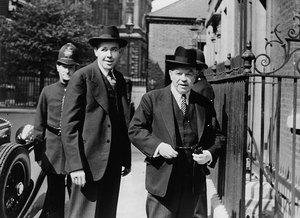Norman Robertson
(diplomat, civil servant, deep state actor, spook) | ||||||||||||||||||||||||||||||||||||||||||||||||||||||||||
|---|---|---|---|---|---|---|---|---|---|---|---|---|---|---|---|---|---|---|---|---|---|---|---|---|---|---|---|---|---|---|---|---|---|---|---|---|---|---|---|---|---|---|---|---|---|---|---|---|---|---|---|---|---|---|---|---|---|---|
 Robertson (left) and Prime Minister Mackenzie King in 1944. | ||||||||||||||||||||||||||||||||||||||||||||||||||||||||||
| Born | 1904-03-04 Vancouver, British Columbia | |||||||||||||||||||||||||||||||||||||||||||||||||||||||||
| Died | 1968-07-16 (Age 64) Ottawa, Ontario | |||||||||||||||||||||||||||||||||||||||||||||||||||||||||
| Nationality | Canadian | |||||||||||||||||||||||||||||||||||||||||||||||||||||||||
| Alma mater | University of British Columbia, Balliol College (Oxford) | |||||||||||||||||||||||||||||||||||||||||||||||||||||||||
| Member of | Rhodes Scholar/1923 | |||||||||||||||||||||||||||||||||||||||||||||||||||||||||
| Interests | • British Security Coordination • Canada/1963 regime change | |||||||||||||||||||||||||||||||||||||||||||||||||||||||||
| Interest of | Thomas Stone | |||||||||||||||||||||||||||||||||||||||||||||||||||||||||
Canadian spook and later Ambassador to the UK and US, and "helped Canada become a part of the intelligence community". Attended the 1961 Bilderberg. Played a role in the overthrow of the John Diefenbaker.government in 1963.
| ||||||||||||||||||||||||||||||||||||||||||||||||||||||||||
Norman Alexander Robertson was a Canadian civil servant,diplomat and spook.[1] Within the Department of External Affairs, he was known as the "secret-service operative".[2] He was the heart of events that had a huge effect on the lives of Canadians and on the world.
Roberson played the central role in Canada's wartime covert activities, where he was liaison to the British Security Coordination, the covert effort to bring the United States into World War 2. After the war, he was involved in the Gouzenko spy case, the founding of the United Nations and of NATO.[3]
He was also deeply involved in the 1963 Canadian regime change, the overthrow of the John Diefenbaker government in 1963.
An Ambassador to the UK and the US, he also attended the 1955, 1956 and 1961 Bilderberg meetings.
Education
Born in Vancouver, British Columbia, he was educated at the University of British Columbia and was a Rhodes Scholar attending Balliol College, Oxford.[1]
Career
He joined the Dept of External Affairs in 1929. He drew the attention of PM W.L. Mackenzie King and Oscar Skelton when he worked out trade policies during the Depression, and in 1941 became undersecretary.[1]
Within External Affairs Norman Robertson was chosen as the liaison person with British Security Coordination, the large covert effort to bring the United States into World War 2. Robertson was an obvious choice because of his extensive work with enemy aliens, earning him the title of "Departmental secret-service operative." Contact with Robertson was made through a Toronto stock broker, William Stephenson's trusted agent in Canada, Tommy Drew-Book. Robertson agreed to the proposal of safe boot camp for training allied saboteurs and subversive agents, and but within a few days approval was given and in an incredibly short time land was made available near Oshawa through the efforts of George Drew, the Leader of the Conservative Opposition in Ontario.[2]
In the autumn of 1940 the Country House, or Camp X as it has now become known, became operative. The Country Home was essentially a British operation, supplied and guarded by the Canadian army. After the installation of Hydra, to link it up with British secret intelligence operations around the world, it was camouflaged as an operation of the Canadian Broadcasting Corporation.ref name=Canada/>
The conduct of these activities made Robertson one of Stephenson's trusted advisers, and "helped Canada become a part of the intelligence community".[2]
Aided by Lester Pearson and Hume Wrong, Robertson directed Canadian diplomacy during WWII.
His postwar work saw two terms as high commissioner in London (1946-49, 1952-57), where he dealt with financial problems and the Suez Crisis, one year (1957-58) in Washington as ambassador, and a second term as undersecretary (1958-64), where he helped bring about the collapse of the John Diefenbaker government in 1963[1].
In his last years he was a professor at Carleton University.[1]
Events Participated in
| Event | Start | End | Location(s) | Description |
|---|---|---|---|---|
| Bilderberg/1955 September | 23 September 1955 | 25 September 1955 | Germany Bavaria Garmisch-Partenkirchen | The third Bilderberg, in West Germany. The subject of a report by Der Spiegel which inspired a heavy blackout of subsequent meetings. |
| Bilderberg/1956 | 11 May 1956 | 13 May 1956 | Denmark Fredensborg | The 4th Bilderberg meeting, with 147 guests, in contrast to the generally smaller meetings of the 1950s. Has two Bilderberg meetings in the years before and after |
| Bilderberg/1961 | 21 April 1961 | 23 April 1961 | Canada Quebec St-Castin | The 10th Bilderberg, the first in Canada and the 2nd outside Europe. |